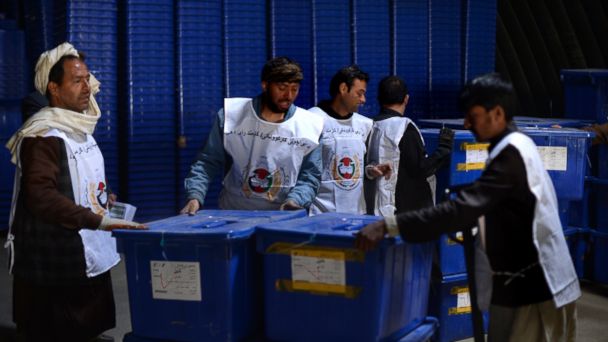Five International Stories You'll Care About Next Week

Afghan election commission workers shift ballot boxes and election material at a warehouse storing materials for polling stations in Kabul on April 3, 2014. (Shan Marai/AFP/Getty Images)
1. Afghanistan
After the deadly build-up to Afghanistan's presidential election, the polls are open in what should be that country's first ever peaceful transition. Twelve years after he took up residence in Kabul's "Arg" Palace, Hamid Karzai is moving out at the end of his second period as president.
Term limits mean he can't seek re-election. But he's not going far - in fact just next door. He's building a new residence on the grounds of the Presidential Palace.
It could be a few weeks before we know the name of the new leader. The winning candidate has to win an absolute majority of votes cast - and with a number of would-be presidents up for election, the poll is likely to go to a second round between the two candidates who finish top this weekend. After the tension in recent years between Hamid Karzai and the U.S. government, his successor could actually be an American (well almost).
Afghanistan's former finance minister Ashraf Ghani was forced to renounce his U.S. citizenship when he stood for election in 2009. A technocrat, he taught at Johns Hopkins University as well as working for the World Bank before plunging into Afghanistan's murky politics. And for all the security concerns, turnout could rival that in the United States: 50% of voters are expected to opt for ballots not bullets.
2. Rwanda
Rwanda marks the 20 th anniversary next week of the event it is forever associated with. In April 1994, Hutu militiamen, soldiers and ordinary citizens murdered some 800,000 Tutsi and politically moderate Hutu. Many were massacred by neighbors, incited to ethnic hatred by a political elite - the fastest killing spree of the 20th century.
The world - including the United States - watched and did nothing, to the despair of aid groups and journalists. Among those outraged, was a young Samantha Power. A decade on, she would earn a Pulitzer Prize for her book, "A Problem from Hell," detailing the Clinton administration's failures in Rwanda.
Another decade later, on Monday, United Nations Ambassador Power leads the U.S. delegation of another Democratic administration to the memorial service in the Rwandan capital, Kigali, just as the U.S. is facing similar criticism for its failure to act in Syria. Post genocide, the story of Rwanda is one of an amazing reconciliation of killers and survivors - a model of reparative justice that has prevented a cycle of revenge and retribution.
3. William and Kate Down Under
After all the fevered anticipation, William and Kate head down under this weekend with the latest heir to the House of Windsor. But just as the president and vice president never travel together, so too the British line of succession.
Booking the tickets for New Zealand wasn't quite as straightforward as calling the travel office. The queen had to give special permission for Prince William to fly with Prince George. Royal protocol dictates that immediate heirs to the throne should not travel together. Also going on the trip is George's new nanny - Maria Teresa Turrion Borrallo - one of eleven in the royal entourage.
As Kate and William's schedule will be jam-packed with traveling and appearances, George will spend most of his time with Maria in three hub locations, which the royals will use as command stations during their travels. The couple arrive on Monday, in the Kiwi capital Wellington, where on Wednesday, Prince George will make his first public appearance with other parents and babies at Government House, the home of New Zealand's Governor General.
4. India
Afghanistan is not the only place going to the polls next week. The first of more than 800 million eligible voters will cast their ballots at 930,000 polling stations on Monday in India in the first phase of an election that will last for more than six weeks. The result could prove awkward for the United States.
For the past decade Washington has boycotted the man widely tipped to win the election. Opposition leader Narendra Modi is accused by human rights groups of turning a blind eye to riots that killed up to 1,000 people in Gujarat in 2002. Most of the victims were Muslims. In 2005, the U.S. refused a visa for Modi under a domestic law that bars entry to any foreign official seen as responsible for "severe violations of religious freedom."
Modi has denied any wrongdoing and investigations have cleared him of personal blame. Signaling a change, the U.S. has promised that "a democratically elected leader of India will be a welcome partner." After a 10-year boycott, Modi might think otherwise.
5. Global Pillow Fight Day
Massive pillow fights are expected to erupt Saturday in hundreds of cities around the world. The events are a sort of flashmob - part of an urban playground movement that says it aims to replace "passive, no-social, branded consumption experiences."
The organizers are promising to turn happy adults into happy kids - and happy kids into even happier kids. From London's Trafalgar Square to Federation Square in Melbourne - as well as New York, Washington and Los Angeles - thousands are expected to "swing and whack fellow pillow-wielding assailants."
Let the feathers fly!